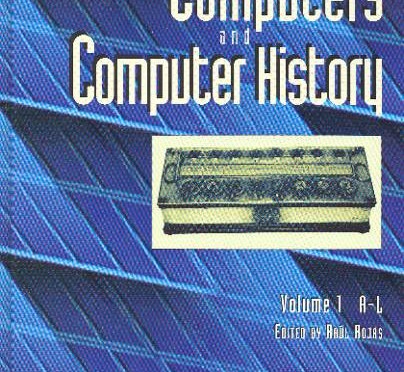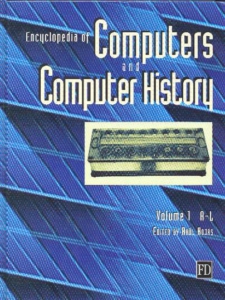Raúl Rojas (ed.), Fitzroy-Dearborn, Chicago, London, 2001
American Library Association RUSA Division
Outstanding Reference Sources, 2002
Current Review for Academic Libraries
Outstanding Academic Title 2001
“Rojas provides an introduction to computers and computer history that has been sorely missing from reference shelves …..”
“. . . . . . .Essential for undergraduate collections, academic and public libraries, and computer science researchers interested in learning more about the rich field and history of computer science.” –Choice
Foreword
„History means different things to different people and can be organized in an almost infinite number of different ways. This is the beauty of an Encyclopedia like this one – you are not forced into dealing with a subject in the way some author thinks is best. You can browse through articles to satisfy your own particular definition of “history” and the type of subject matter you find interesting.
Of course a volume like this can never contain all the information on a specific subject. That was shown to be the case about 250 years ago when the French attempted to make an encyclopedia which would contain information on all of the Arts, Science, and Technology. The major editor (Denis Diderot, because of whom this work is always called “Diderot’s Encyclopedia) started with about 100 of the greatest French writers and produced a huge work that did, indeed, chronicle much of the science and technology of the day. While it was a brave effort, it could never have covered all human knowledge and other works had to be written to expand on many subjects. This current volume is no exception in that it can not be complete. However it does point the way by giving a basic background upon which to build more complete knowledge. Once the information contained in these pages is absorbed (not the whole thing of course – likely the only person to read it cover to cover will be the editor), you should be in a very good position to look elsewhere for the fine detail needed for your specific needs. Most major libraries will have technical books and perhaps even technical history journals. The World Wide Web will also allow you to go further, but you must be cautious because, unlike this volume which has been written by experts in the field, much of the material on the Web is of dubious origin. It is not that the designers of Web-sites are deliberately trying to mislead (although I am sure that some are), but rather that they come to a subject with specific interests and objectives — just like the readers of this Encyclopedia. By using this volume as a resource reference you can not only check facts found elsewhere, but can use the entries to explain things that various web designers have simply taken for granted.
No matter what use you make of this volume, I know you will find it enjoyable.”
Michael R. Williams
Professor of Computer Science
University of Calgary
Calgary, Canada



